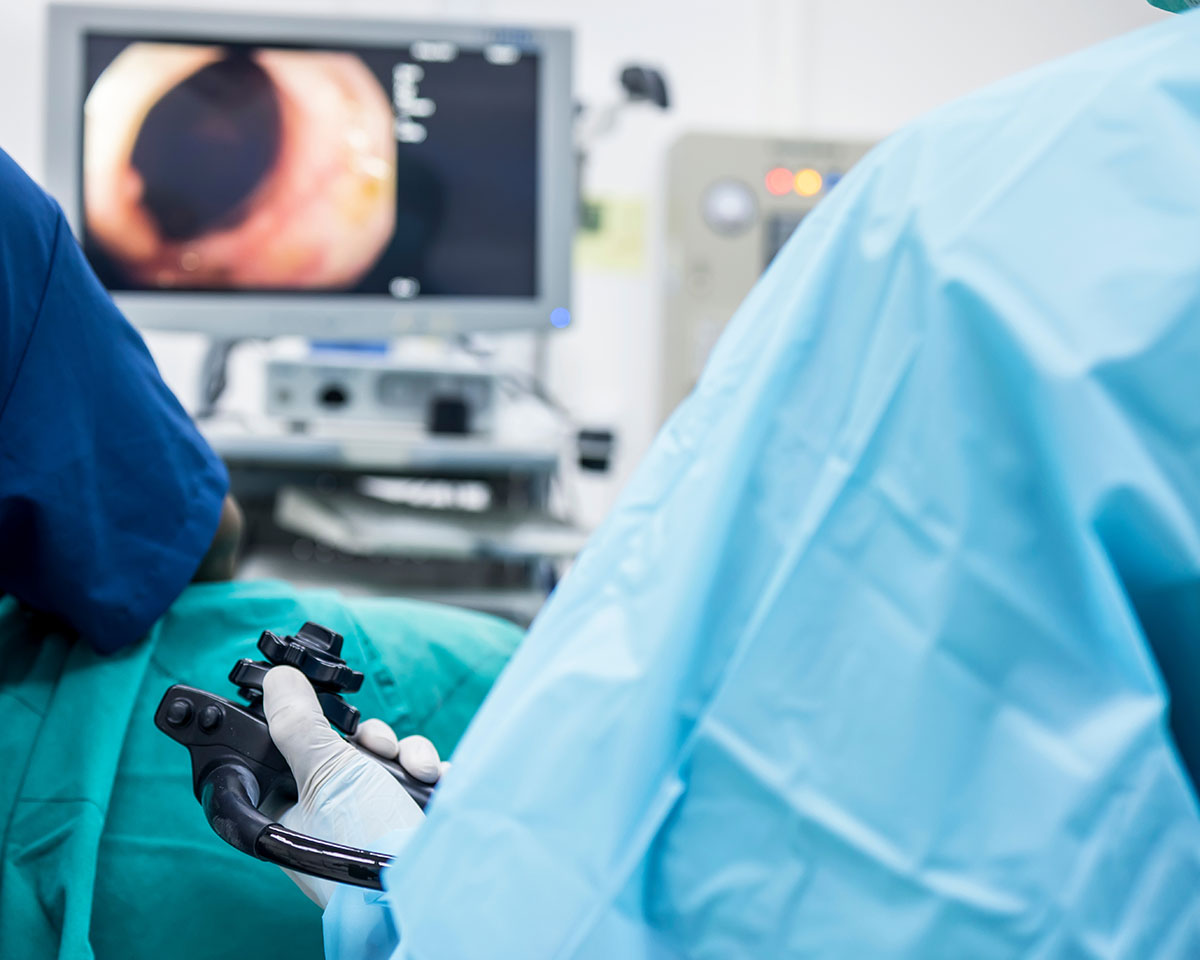You may be perplexed when considering gastroscopy vs endoscopy, or even endoscopy vs gastroscopy. The world of medical jargon can often be intricate to navigate. This becomes particularly true when considering endoscopy, colonoscopy, and gastroscopy procedures. Each term blends into the other. Fortunately, our team at Colorectal Surgery is here to simplify these essential diagnostic procedures and their specific uses.
Table of Contents
Toggle1. What Is An Endoscopy?

An endoscopy is a minimally invasive technique that offers a close-up examination of an individual’s body. Using an endoscope – a flexible tube equipped with a light and camera – doctors can capture detailed images of the digestive system, displayed on a colour television monitor. Endoscopies are performed to identify and diagnose digestive conditions.
2. Gastroscopy: A Specific Type Of Endoscopy
Although ‘endoscopy‘ is a broad term encompassing various internal examinations using an endoscope, it’s essential to understand the specificity of gastroscopy as a distinct endoscopic procedure. During a gastroscopy, a slender and flexible endoscope is gently inserted through the mouth and guided down the oesophagus to explore the intricate lining of the stomach.
This meticulous examination of the stomach lining allows the detection and evaluation of various conditions, including ulcers, inflammation, tumours, and other abnormalities. By obtaining direct visual information, gastroscopy provides valuable insights into the health of the stomach, aiding in accurate diagnosis and guiding appropriate treatment plans.
Gastroscopy is often used to detect conditions like gastric polyps, which may cause symptoms similar to other stomach issues.
3. Endoscopy Vs Gastroscopy
While the term ‘endoscopy’ is commonly employed to describe the internal visual examination of the body using an endoscope, it’s essential to recognize that gastroscopy represents a particular subtype within endoscopic procedures.
In the case of gastroscopy, a thin endoscope is delicately inserted through the mouth, traversing the oesophagus to reach and scrutinise the lining of the stomach. This focused procedure allows our proficient surgeons to thoroughly evaluate the stomach’s condition, identify potential abnormalities or diseases, and provide accurate diagnoses.
4. Gastroscopy Vs Endoscopy: Which One Is Right For You?
When deciding between gastroscopy and endoscopy, the key factors are your specific symptoms and the area of concern within your digestive system. At Colorectal Surgery, Dr Leong and our dedicated clinicians believe in your medical history, symptoms, and overall health to recommend the most suitable procedure.
Our commitment to personalised care means you can trust us to guide you towards the process that will yield the most beneficial outcomes for your digestive health.
With our expertise and deep understanding of gastrointestinal conditions, we will guide you towards the optimal diagnostic approach, ensuring that you receive personalised and effective care. Rest assured that your well-being is our top priority, and we strive to provide the highest level of medical expertise and compassion throughout your journey.
5. Endoscopy Vs Colonoscopy Vs Gastroscopy
Bringing colonoscopy into the mix adds another layer of complexity to the comparison. While an endoscopy allows for a comprehensive examination of multiple areas within the digestive system, a colonoscopy, on the other hand, is dedicated explicitly to thoroughly inspecting the colon, which is the large intestine.
This specialised procedure is vital in detecting and preventing colorectal cancer and identifying other gastrointestinal conditions such as inflammatory bowel disease and polyps. By meticulously examining the entire length of the colon, a colonoscopy provides valuable insights into the health of this crucial part of the digestive system.
This procedure holds immense significance in the detection and prevention of colorectal cancer, as well as the identification of other gastrointestinal conditions. With meticulous attention to detail, our experienced team focuses on delivering exceptional colonoscopy services to Singaporeans and residents, ensuring accurate diagnoses and optimal outcomes for their digestive health.
6. Colonoscopy And Gastroscopy
A colonoscopy and a gastroscopy are both endoscopic procedures, but they inspect different parts of the digestive tract. A gastroscopy examines the upper digestive tract, including the oesophagus, stomach, and the first part of the small intestine. Meanwhile, a colonoscopy investigates the lower digestive tract, specifically the large intestine.
Gastroscopy and colonoscopy share similarities in preparation, as both require specific steps to ensure accurate results.
7. How To Choose Between Gastroscopy And Endoscopy
When deciding between gastroscopy and endoscopy, the choice hinges upon the specific symptoms experienced and the area of concern within the digestive system. Gastroscopy helps investigate persistent heartburn, difficulty swallowing, unexplained weight loss, or abdominal pain. It allows for direct visualisation of the oesophagus, stomach, and upper small intestine, aiding in identifying conditions such as ulcers, inflammation, or even early-stage cancers.
At Colorectal Surgery, Dr Leong understands the importance of personalised care and takes a comprehensive approach to recommend the most suitable procedure for each patient. We will thoroughly evaluate your medical history, symptoms, and overall health, and our team can make an informed decision tailored to your needs.
If you have questions, concerns, or specific preferences, we are here to address them. Our doctors will take the time to explain the potential benefits and risks associated with each procedure, ensuring that you have a clear understanding of your options.
8. Comparing Procedures: Gastroscopy, Colonoscopy And Endoscopy
When comparing gastroscopy, colonoscopy, and endoscopy, it is vital to remember that these are not interchangeable procedures. Each one serves a specific purpose and allows for the examination and treatment of different parts of the digestive system.
9. Colonoscopy: An Examination of The Large Intestine
In comparing endoscopy vs colonoscopy vs gastroscopy, it’s important to note that colonoscopy focuses explicitly on examining the colon, which is the large intestine. This procedure is vital in detecting and diagnosing conditions such as colorectal cancer, inflammatory bowel disease, and polyps.
A colonoscopy helps identify potential abnormalities and provides valuable insights into one’s digestive health.
10. Procedure Risks And Considerations
As with any medical procedure, it’s essential to acknowledge that gastroscopies, colonoscopies, and endoscopies carry their own risks and considerations, such as:
- Mild discomfort during and post-procedure
- Sore throat
- Gas and bloating
- Cramps or pain in the abdomen
Although rare, serious complications such as bleeding, perforation in the colon, or adverse reactions to the anaesthesia may occur. Rest, assured, these endoscopic procedures remain the gold standard in determining colorectal and abdominal issues. The decision to perform such procedures is done after your doctor carefully assesses the potential benefits and risks for you, as a patient.
Conclusion
We hope this post has clarified the differences and purposes of these three procedures: gastroscopy, colonoscopy, and endoscopy. If you’re dealing with digestive health issues and would like to discuss your options, don’t hesitate to contact Dr Leong, an expert colorectal surgeon in Singapore. He can provide colonoscopy screenings and also treat other conditions like haemorrhoids, gallstones, gastritis, and other abnormal changes in bowel habits.
Schedule a consultation today and ensure the best outcomes for your gut health.
Frequently Asked Questions
What Are The Risks Of Gastroscopy?
Gastroscopy, like any medical procedure, carries a minimal risk of complications. While complications are rare, being aware of potential hazards is essential. Some possible risks associated with gastroscopy include bleeding, infection, perforation (a small tear or hole in the gastrointestinal tract), and adverse reactions to sedation or anaesthesia.
Which Procedure Is More Appropriate For Stomach Issues, A Gastroscopy Or A Colonoscopy?
An upper gastrointestinal endoscopy (Gastroscopy) is generally more appropriate for stomach issues, allowing the doctor to examine the stomach lining directly from the upper gastrointestinal tract.
Is There Any Discomfort During Or After An Endoscopy?
While you may experience minor discomfort, endoscopies are generally not painful due to the sedation provided.
How Long Does A Gastroscopy Procedure Take?
A gastroscopy typically takes about 15 to 20 minutes.
Can I Eat Before An Endoscopy, Gastroscopy Or Colonoscopy?
Usually, your doctor will ask you to fast for several hours before these procedures.
Can These Procedures Detect Cancer?
Yes, doctors can use gastroscopies, colonoscopies, and endoscopies to detect cancers like colon cancer in the lower gastrointestinal tract, which is proven to be more efficient than breast cancer screening from tissue samples.
Does Medical Insurance Cover These Procedures In Singapore?
Most medical insurance policies in Singapore cover these procedures, but it’s best to check with your insurer.





